If you’re looking for Othello short summary and analysis, you’re in the right place! William Shakespeare’s Othello centers around two main characters: a general in the Venetian army called Othello and his manipulative ensign Iago. Othello’s plot is full of twists and turns.
In this article, our writers prepared a short Othello summary. You will also find here a longer act-by-act synopsis and an analysis of the play.
💡 Othello: Short Summary
Let’s start with Othello’s synopsis.
At the beginning of the play, readers learn that Iago has resentment towards Othello because a soldier named Cassio has been promoted in front of him.
First, he convinces a man named Roderigo to start a street fight with Cassio. Othello blames Cassio for that and takes his rank away. Then, he tricks Othello into thinking that his beautiful wife Desdemona has an affair with Cassio. He plants seeds of doubts in Othello’s heart slowly. He also advises other characters in the play, such as Roderigo, Cassio, and Emilia, and they unintentionally help him execute his master plan. Iago manipulates everyone.
Enraged, Othello murders his wife. Shortly after, he finds out that Desdemona was faithful to him. Emilia exposes her husband’s scheme and becomes his last victim. Iago gets caught by the authorities. In the finale of the play, Othello murders himself. The play ends with the monologue in which Othello asks the audience to remember him as a good man.
📙 Othello Summary: Act by Act
The play starts in Venice amid the conflict between the Ottoman Empire and the Republic of Venice. At the beginning of the play, readers learn that Turks are about to target either Rhodes or Cyprus. Venetians are preparing for war. However, another conflict is about to begin.
Act 1: Scene 1
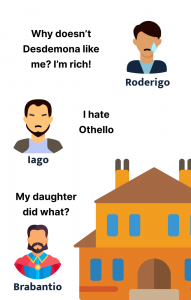
Roderigo and Iago discuss Othello’s secret marriage to Desdemona, Brabantio’s daughter. Roderigo is secretly in love with Desdemona, while Iago is furious that Othello promoted Michael Cassio instead of him.
Driven by revenge, Iago comes up with a plan to inform Brabantio, the father, about Desdemona’s secret marriage. In this first scene of the play, Iago gets Roderigo on his side and stages the outcry underneath the doors of Desdemona’s father.
At first, Brabantio, a wealthy Venetian politician, does not believe them. Although Iago remains unidentified, he is trying his best to make him hateful towards Othello. When Brabantio goes to check on Desdemona, he sees that his daughter is not in her room. He gathers a group of men to go and search for her.
Act 1: Scene 2
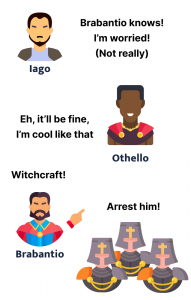
In the meantime, Iago leaves the scene and goes to Othello to inform him about the situation. Iago narrates the events as if he was the one protecting Othello’s dignity. By doing that, Iago is trying to provoke Othello to act angrily towards Brabantio. He knows that if Othello kills Desdemona’s father, he will lose everything. However, Othello remains calm and states that what he has done for Venice should help him win this case.
When Brabantio finally sees Othello, he accuses him of using witchcraft to make Desdemona fall in love with him. Brabantio is sure that his daughter would never fall for a black man if it would not be for magic. He even tries to make Othello arrested, but in the end, they decide to take this matter to the Duke.
Act 1: Scene 3
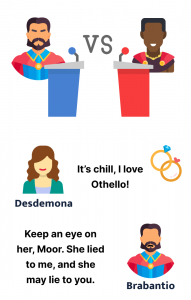
When Othello and Brabantio enter the Senate, readers see how respected and influential Othello is. Even though Brabantio’s name is the first to be announced, the Duke greets Othello first, and only after that, he greets Brabantio.
The Duke questions Othello’s story, but Desdemona enters the Senate and clarifies the situation. The Duke is touched, and Brabantio is forced to accept the marriage. However, he says something that Iago will use against Othello later on: “Look to her, Moor, if thou hast eyes to see: She has deceived her father and may thee.”
The Duke decides that Othello must go to Cyprus to defend the island from the Turks. Desdemona accompanies Othello.
Act 2: Scenes 1-2

In the next act, readers see Othello, Desdemona, Iago, and Roderigo in Cyprus. Emilia, Iago’s wife, travels to Cyprus as well. Readers also learn that a storm destroyed the Turkish fleet. Othello orders everyone to celebrate.
Iago comes up with a plan to convince Othello that Desdemona is having an affair with Cassio. He starts by brainwashing Roderigo and keeps spreading these lies to overtake Cassio’s position.
Act 2: Scene 3
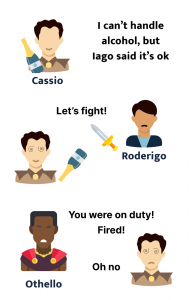
Iago spurs Roderigo into a quarrel with Cassio, which isn’t complicated to do. Iago knows that Cassio is alcohol-intolerant and deliberately offers him a drink. Cassio gets into a fight with Roderigo, who is following Iago’s plan. Being a soldier, Cassio easily beats Roderigo, Yet, he accidentally wounds Montano, who was trying to break the fight. Othello blames Cassio for the quarrel and strips his rank away.
When Cassio sobers up and realizes what has happened, he talks to Iago about it. Cassio is very concerned about his reputation. Iago, pretending to be a friend, suggests that Cassio goes and appeals to Desdemona.
Act 3: Scenes 1-3

Desdemona hears Cassio and assures him she will convince her husband to get his rank back. When Cassio sees Othello and Iago, he, ashamed, rushes to leave. In response, Iago puts a seed of doubt into Othello’s mind. Iago uses this moment to hint at Desdemona’s infidelity.
Desdemona asks Othello about Cassio’s case as soon as she sees him. The husband becomes visibly irritated. Desdemona offers her handkerchief, but Othello declines and drops it. Emilia, Iago’s wife, picks it up and gives it to Iago. She also remarks that her husband asked her to steal it several times.
Othello demands Iago to present some physical evidence of the affair, and Iago claims that Cassio has Desdemona’s handkerchief. That’s enough for Othello. He promises to kill Desdemona, while Iago swears he will kill Cassio.
Act 3: Scene 4
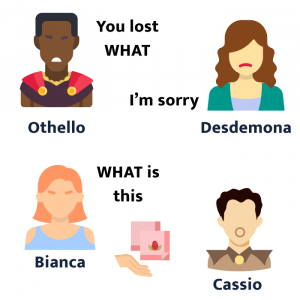
When Othello learns that Desdemona does not have the handkerchief anymore, it serves as an ultimate material proof of her infidelity. Othello can’t deal with this adultery anymore and verbally harasses his wife. Meanwhile, Iago forces Cassio to talk to Desdemona once again.
Meanwhile, Cassio hands his lover, Bianca, Desdemona’s handkerchief. She is rightfully furious, while Cassio doesn’t understand what’s going on.
Act 4: Scene 1
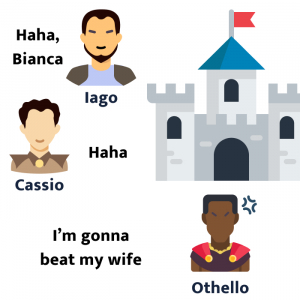
Iago encounters Cassio and asks about his relationship with Bianca. He makes Othello listen to the part of his speech, which makes it seem as if Cassio has an affair with Desdemona. It works.
Othello is so blinded by jealousy that he loses control over himself. Amid a conversation, Othello physically abuses Desdemona, which completely breaks Desdemona’s spirit. From now on, Desdemona changes.
Act 4: Scene 2
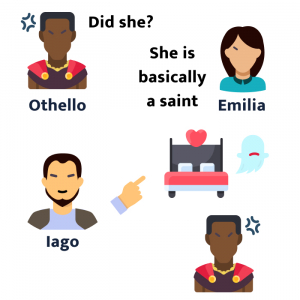
Othello questions Emilia about Desdemona’s infidelity, but she defends her mistress with fury.
We see Iago making his ultimate attempt to destroy Othello and his marriage. In this scene, Iago gives an idea to Othello of how to kill Desdemona, “Do it not with poison, strangle her in her bed, even the bed she hath contaminated.”
Act 4: Scene 3

Othello demands Desdemona to go to bed and send Emilia and her other servants away for the night. Before getting ready for bed, Desdemona remembers a song that one of her mother’s servants used to sing. It is about a woman whose lover left her.
Desdemona is melancholic and alienated from Othello. Emilia comforts her and explains to her that men are always jealous; that Othello loves her. Desdemona is surprised that some women cheat on their husbands. This private conversation between Emilia and Desdemona shows what an innocent young lady she is.
Act 5: Scene 1
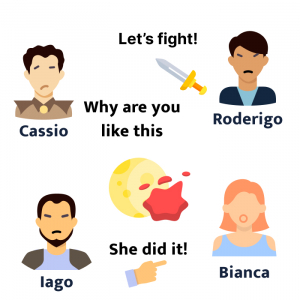
Iago convinced Roderigo to kill Cassio and made him act on his promise. He stages the fight between the men, yet it goes wrong. Even though Iago tries to help, wounding Cassio, the fight is stopped.
As Bianca enters, Iago tries to put the blame on her. While everyone tries to make sense of the situation, he murders the wounded Roderigo.
Act 5: Scene 2
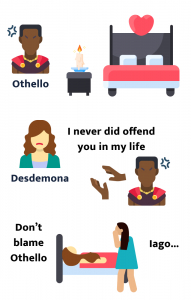
Being sure that Iago murdered Cassio, Othello enters the room where Desdemona is sleeping. He kisses her, she wakes up, and he encourages her to confess her sins. Desdemona says, “I never did offend you in my life.” He refuses to believe her and strangles her.
Emilia discovers Desdemona nearly dead. Desdemona once again says that she loves Othello. She adds that he is not to blame for her death, claiming that she killed herself. When Othello explains to Emilia that he killed Desdemona because of her affair with Cassio, Emilia realizes her husband is the one to blame.
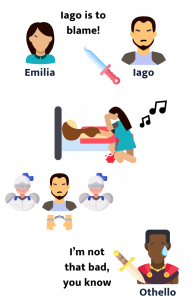
Emilia accuses Iago in front of other characters, and Othello understands that he has been betrayed and manipulated by “honest Iago” all this time. Iago stabs Emilia. Nearly dying, she crawls to her mistress, repeating that Desdemona loved Othello righteously. Othello tries to kill Iago, but the authorities catch him before that.
After a monologue, Othello kills himself. His suicide is the punishment he inflicts on himself for killing Desdemona. Even though Iago manipulated Othello, he understands that he is the one responsible for the acts. He says that he hopes to be remembered for the good deeds he has done in his final speech, not as a villain. He says, “Speak of me as I am. Nothing extenuate nor set down aught in malice.”
⏳ Othello: Analysis
Othello is a tragedy about love, jealousy, loyalty, friendship. It tells the story of the general of the Venitian army during the conflict between the Ottoman Empire and Venice. However, there is no war in the play. The war has ended even before starting, and everyone celebrates peace. Everyone besides Iago.
Othello differs from any other works written by Shakespeare. It is a very compressed play and has an unusual structure for a Shakespearean tragedy. Some critics even talk about the notion of double-time that is present.
The first two acts have an average pace and timing. However, towards the end of the play, in the third act, time starts speeding up. A lot of the events happen very quickly, and there is a lot of confusion.
Several main conflicts move the play. The first one is Othello’s inner conflict that leads to the destruction of the marriage and death of both Desdemona and Othello. Despite the facade of a strong military hero, Othello in the play is a very passive character. Although he is known as a man of actions, a warrior, his actions do not drive the plot. Even from Othello’s short summary, it’s apparent that at the beginning of the play, Othello is very rational. He is confident that Desdemona loves him. In the second part, he becomes insecure, chaotic, poisoned with jealousy.
The same can be said about Desdemona. At the beginning of the play, she is a very strong character: she leaves her father, marries interracially, defends her relationships in front of the Duke, travels to Cyprus, speaks to Othello on behalf of Cassio. However, in the second half, she becomes a passive woman, or one might even say – she becomes a victim. The more furious and jealous Othello becomes, the more submissive and passive Desdemona is. She might be trying to prove her love for Othello in this manner as well.
Contrarily to Othello and Desdemona, Iago is the character who drives the plot. In some way, he is staging the whole play. For instance, Iago orchestrates a fight between Cassio and Roderigo. He makes Othello question Desdemona and even proposes a scenario of how the problem should be dealt with. Iago is the character that speaks the most in the play. Interestingly enough, once Iago’s plot becomes evident to others, he becomes silent.
Iago’s character is one of the most complex and intriguing characters in the play. A lot of critics find Iago to be a symbolic character that represents evil and wickedness. However, from Othello’s summary, readers know that Iago has motifs for hatred:
- He was not promoted.
- He suspects that Othello had an affair with his wife, Emilia.
- He also thinks that Cassio had an affair with Emilia.
- Additionally, he may be in love with Desdemona or even Othello.
Iago states that he simply hates Othello. Readers do not know if the affair between him and Iago’s wife happened or Iago is trying to manipulate his audience to sympathize with him.
Another essential conflict in the play is the conflict of race. Many critics argue that Othello’s race is an incidental factor and does not add anything to the understanding of the play. Moreover, some believe that if you start looking at Othello through the prism of race, it will take away Othello’s universality as a character. A careful reader will see that it is not that easy.
There is a lot of racist language in this play. One of the ways it manifests itself is through the way characters do not use Othello’s name. Iago does not do so in particular; he calls him “The Moor.” Othello himself believes that Desdemona’s love for him is something unnatural. However, this thought prevails and drives him crazy only in the second half of the play.
It is crucial to also pay attention to the juxtaposition of two contrasting cities in Othello’s plot, a dichotomy between Venice and Cyprus. In Shakespeare’s works, it is more than a simple geographical contrast. It represents the moral and behavioral change altogether. In Othello, Venice symbolizes civility, while Cyprus serves as a symbol of wilderness and primitive impulses. No wonder Othello smothers Desdemona in Cyprus.
Thanks for reading our summary and analysis! To learn more about Othello, read other articles regarding the play. You can find them below.
